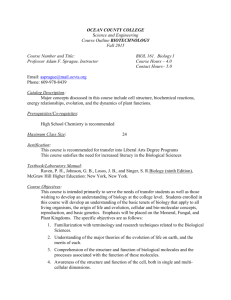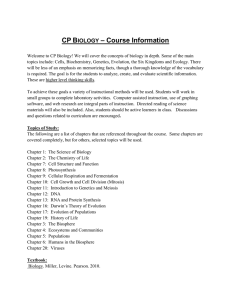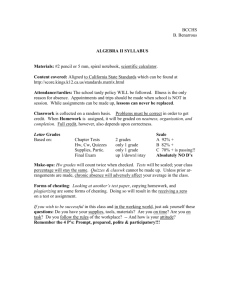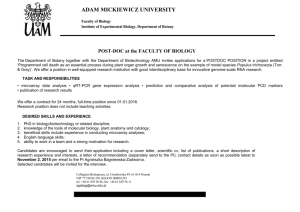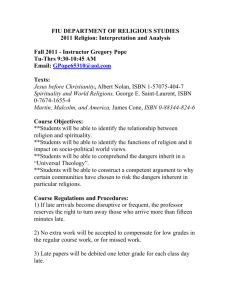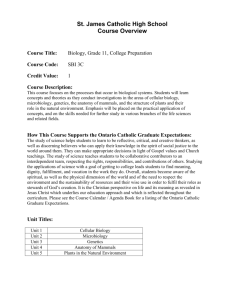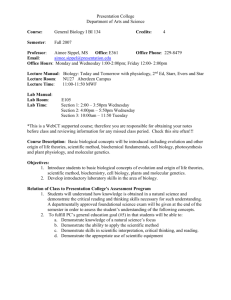INTRODUCTION TO BOTANY Week
advertisement
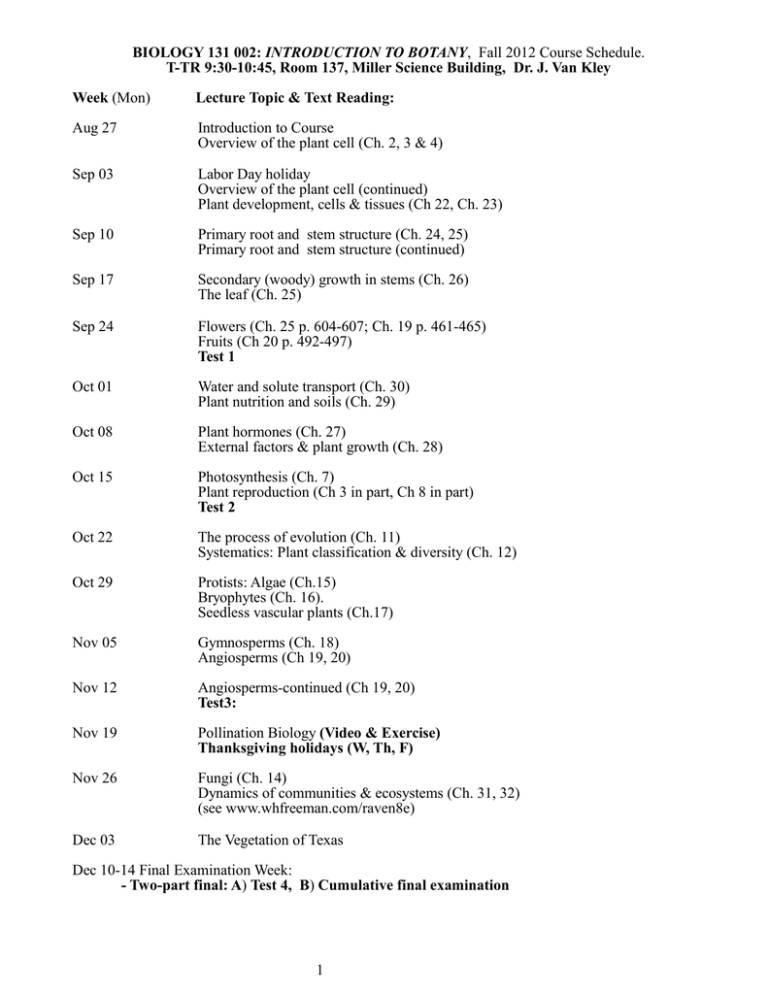
BIOLOGY 131 002: INTRODUCTION TO BOTANY, Fall 2012 Course Schedule. T-TR 9:30-10:45, Room 137, Miller Science Building, Dr. J. Van Kley Week (Mon) Lecture Topic & Text Reading: Aug 27 Introduction to Course Overview of the plant cell (Ch. 2, 3 & 4) Sep 03 Labor Day holiday Overview of the plant cell (continued) Plant development, cells & tissues (Ch 22, Ch. 23) Sep 10 Primary root and stem structure (Ch. 24, 25) Primary root and stem structure (continued) Sep 17 Secondary (woody) growth in stems (Ch. 26) The leaf (Ch. 25) Sep 24 Flowers (Ch. 25 p. 604-607; Ch. 19 p. 461-465) Fruits (Ch 20 p. 492-497) Test 1 Oct 01 Water and solute transport (Ch. 30) Plant nutrition and soils (Ch. 29) Oct 08 Plant hormones (Ch. 27) External factors & plant growth (Ch. 28) Oct 15 Photosynthesis (Ch. 7) Plant reproduction (Ch 3 in part, Ch 8 in part) Test 2 Oct 22 The process of evolution (Ch. 11) Systematics: Plant classification & diversity (Ch. 12) Oct 29 Protists: Algae (Ch.15) Bryophytes (Ch. 16). Seedless vascular plants (Ch.17) Nov 05 Gymnosperms (Ch. 18) Angiosperms (Ch 19, 20) Nov 12 Angiosperms-continued (Ch 19, 20) Test3: Nov 19 Pollination Biology (Video & Exercise) Thanksgiving holidays (W, Th, F) Nov 26 Fungi (Ch. 14) Dynamics of communities & ecosystems (Ch. 31, 32) (see www.whfreeman.com/raven8e) Dec 03 The Vegetation of Texas Dec 10-14 Final Examination Week: - Two-part final: A) Test 4, B) Cumulative final examination 1 INTRODUCTION TO BOTANY: BIOLOGY 131 --------------------------------------------------------------------------------------------------------------------------Instructor: Dr. J. Van Kley; Office, Rm.115; Phone (936) 468-2068; Email: jvankley@sfasu.edu Office Hours: M,W- 11-1; T, 11-12, 1-3; Th 11-2 Text: Raven Evert & Eichhorn, 2013. The Biology of Plants, 8th edition. Course Description: We humans, as living organisms, depend on the plant world to provide us with food, energy, wood, fiber and to sustain the rich web of life on our earth. Today, with increasing human pressure on earth's ecosystems, the ecological future of the earth may depend on decisions made by humans from our generation. For these reasons, a basic knowledge of life-processes and an awareness of the plant world is a vital part of education regardless of what profession one is preparing for. This course introduces you basic biological concepts and will expose you to several of the sub-disciplines of botany: including cell biology, genetics, plant anatomy, plant physiology, and ecology. Grading policy: There will be four tests, and one cumulative final each worth 1/5 of the lecture grade. Tests will be taken using test forms available in the bookstore. Additionally, I reserve the right to "pop" quizzes or give participation points to those present at any time. Quizzes will cover assigned readings or material recently discussed in lectures. Quiz grades & participation points will count as bonus points (up to 6%) towards the next test. An exercise on pollination biology will also contribute to the grade of the fourth test. The lecture grade will constitute 3/4 and the lab grade 1/4 of the total course grade. Your total percentage will be calculated as 0.75 x percentage of points from lecture + 0.25x lab percentage. Since this is a foundation course for the Biology major/ minor I do not allow “extra credit” projects to improve your grade. Grades earned must reflect your mastery of the required course material! Tentatively, the following scale will be used to calculate grades: Total percentage > 90% = A 80% - 89% = B 70% - 79% = C 60% - 69% = D < 60% = F Make-up exams will be allowed only for students with excused absences. Only students with legitimate conflicts such as with University-sponsored events, serious illness, or family emergencies will be granted an excused absence. You must provide written verification from a family member, dean or doctor, etc. to be excused. Please inform me beforehand if you now you must miss a test. Students with unexcused absences will receive a ZERO for any missed tests or quizzes. A student cannot properly prepare for a profession by cheating. The MINIMUM penalty for cheating is a ZERO for the test or quiz in question (see policy A-9.10). Attendance & Participation: Students are expected to come to class and participate in class activities. In most cases, attendance results in poor performance on tests. You will be asked to fill out a seating chart. I may use the chart to take attendance at the beginning of the class period; empty seats will be marked absent. I may also give bonus participation points to students who are present when I check attendance. Excused absence does not entitle one to make up bonus quizzes or participation points. University policy states that instructors may fail students who miss more than the equivalent of 3 regular-semester weeks of class. I reserve the right to fail any student with 7 or more unexcused absences for the lecture section. Additionally, I will consider attendance for students with borderline grades. For example, a student with good attendance and a score of 79 may receive a "B" rather than a "C". According to Biology Department policy, participation in the anonymous online course evaluations is a requirement for the course. Therefore, students who do not participate in the evaluations will be penalized one percentage point from their final score. Telephones: Telephones & pagers are extremely disruptive and must be turned off, or better yet, not taken to class. Texting interferes with the computer projection system. Students whose phones ring repeatedly or who are seen texting will be asked to leave and will be counted as absent for that day. Phones must be packed away on test days. If I see a phone during a test I may assume that it is being used for cheating. Lecture notes & syllabus: Copies of the lecture notes or this syllabus may be downloaded from <http://src.sfasu.edu/~jvk/Courses/Bio131.html>. Alternatively, you may bring a USB device to class or my office and I will copy the notes to it. 2 Bio 131: Introduction to Botany Course Description & Objectives: Introduction to the fundamental principles of botany and plant sciences. Topics include the study of plant form, function, reproduction, and an overview of plant diversity including bryophytes, ferns, and seed plants. Program Learning Outcomes: Each course objective and student learning outcome listed below corresponds to the Biology Department PLO 1 to develop knowledge of biological concepts. EEOs: This course fulfills the general education exemplary educational objectives for the science curriculum. Bio 131 covers EEOs 1, 3, 4, and 5. Course Objectives: 1. To introduce students to the basic features of plant cells with a specific emphasis on plant specific organelles, including an introduction to plant tissues. 2. To introduce students to the basic morphology, anatomy, and function of plant roots, stems, and leaves 3. To provide students with an understanding of plant physiological processes, with a special emphasis on photosynthesis, the light reactions, the Calvin Cycle, and variations of the photosynthetic pathways. 4. To present the basic principles of plant reproduction, life cycles, and reproductive features. 5. To introduce students to plant diversity, including key innovations and reproductive features of each plant group. Student Learning Outcomes (Course Competencies): 1. Students will be able to understand the structure and functions of plant cells, organelles, tissues, and tissue systems. 2. Students will be able to understand the structure and function of plant roots, stems, and leaves. This outcome builds on the foundational materials included in the first learning outcome. 3. Students will understand the principles of photosynthesis, including a knowledge of energy molecules (ATP and NADPH); the light reactions including its products and byproducts; the Calvin Cycle and its products; the relationship between the light reactions and Calvin Cycle; and C4 and CAM photosynthesis. 4. Students will gain an understanding of basic plant reproduction, including the concepts of life cycles, alternation of generations, gametangia, sporangia, and specialized reproductive features. 5. Students will learn the basics groups of land plants including bryophytes, lycophytes, ferns, gymnosperms, and angiosperms. Students will learn key morphological and anatomical features of each group, and reproductive features, This learning outcome is closely linked to outcome number 4. Miscellaneous Academic Integrity (A-9.1) Academic integrity is a responsibility of all university faculty and students. Faculty members promote academic integrity in multiple ways including instruction on the components of academic honesty, as well as abiding by university policy on penalties for cheating and plagiarism. Definition of Academic Dishonesty Academic dishonesty includes both cheating and plagiarism. Cheating includes but is not limited to (1) using or attempting to use unauthorized materials to aid in achieving a better grade on a component of a class; (2) the falsification or invention of any information, including citations, on an assigned exercise; and/or (3) helping or attempting to help another in an act of cheating or plagiarism. Plagiarism is presenting the words or ideas of another person as if they were your own. Examples of plagiarism are (1) submitting an assignment as if it were one's own work when, in fact, it is at least partly the work of another; (2) submitting a work that has been purchased or otherwise obtained from an Internet source or another source; and (3) incorporating the words or ideas of an author into one's paper without giving the author due credit. Please read the complete policy at http://www.sfasu.edu/policies/academic_integrity.asp Withheld Grades Semester Grades Policy (A-54) Ordinarily, at the discretion of the instructor of record and with the approval of the academic chair/director, a grade of WH will be assigned only if the student cannot complete the course work because of unavoidable circumstances. Students must complete the work within one calendar year from the end of the semester in which they receive a WH, or the grade automatically becomes an F. If students register for the same course in future terms the WH will automatically become an F and will be counted as a repeated course for the purpose of computing the grade point average. The circumstances precipitating the request must have occurred after the last day in which a student could withdraw from a course. Students requesting a WH must be passing the course with a minimum projected grade of C. 3 Students with Disabilities To obtain disability related accommodations, alternate formats and/or auxiliary aids, students with disabilities must contact the Office of Disability Services (ODS), Human Services Building, and Room 325, 468-3004 / 468-1004 (TDD) as early as possible in the semester. Once verified, ODS will notify the course instructor and outline the accommodation and/or auxiliary aids to be provided. Failure to request services in a timely manner may delay your accommodations. For additional information, go to http://www.sfasu.edu/disabilityservices/. Acceptable Student Behavior Classroom behavior should not interfere with the instructor’s ability to conduct the class or the ability of other students to learn from the instructional program (see the Student Conduct Code, policy D-34.1) . Unacceptable or disruptive behavior will not be tolerated. Students who disrupt the learning environment may be asked to leave class and may be subject to judicial, academic or other penalties. This prohibition applies to all instructional forums, including electronic, classroom, labs, discussion groups, field trips, etc. The instructor shall have full discretion over what behavior is appropriate/inappropriate in the classroom. Students who do not attend class regularly or who perform poorly on class projects/exams may be referred to the Early Alert Program. This program provides students with recommendations for resources or other assistance that is available to help SFA students succeed. 4
